Matthew 1.18-2.20
Exactly one year ago, I got a call from someone who worships with us online. Debbie told me that her father was dying in Mary Washington hospital in Fredericksburg. After several days of unresponsiveness he’d woken up at five that morning and announced unexpectedly that he wanted to speak with a Methodist minister. I took the train down on Wednesday morning to avoid the traffic on the highway.
When I got to his room, I discovered that Merle was almost completely deaf. His daughter had a stack of index cards and a supply of black sharpies. She introduced us. Because his hearing loss made our communication necessarily one way, at first I listened to him.
Merle’s initials are “MF” and he’d always liked that his initials implied that he was a bit of a hard-ass and a stoic. The persona suggested by his initials went with the purple birthmark on his bottom lip that made him look like he’d just walked away from a fight. Indeed, he told me, he’d fought in World War II, Korea, and Vietnam before settling down to carry mail.
I listened as he told me about his life and his regrets, the chief one being a wife he left for another.
“I don’t know whether or not I’m fit for heaven,” he said to me, “Do you?”
I smiled and immediately thought of that verse from the Christmas carol: “And fit us for heaven to live with thee there.”
Notice—
The final verse of “Away in the Manger” is addressed to Jesus.
We’re not the ones fitting ourselves for heaven.
“I don’t know if I’m fit for heaven,” Merle said to me.
“Do you know?” he asked me.
I nodded.
And I mouthed, “Yes.”
Taking that as my cue, I moved to apply the certainty of faith to him. But because of his deafness, I had to write out all my priestly parts. The words had to take flesh.
Like Sheriff Rick Grimes in Love Actually— the absolute worst Christmas movie of all time— I wrote it all out by hand in clear block letters with thick black ink. And then I numbered them. And then, standing next to his bedside, I held them up to him, one at a time, to read.
The questions came straight out of the baptism liturgy.
“#1— Merle, do you repent of all your sins?”
And he nodded as earnestly as anyone I’ve ever seen.
“#2 — Do you put your whole trust in Jesus Christ and his grace alone?”
“ I do,” Merle said like he was promising a wedding vow.
Cards #3 and #4 and #5 said, “Merle, in the name of Jesus Christ and by his authority alone, I announce to you the entire forgiveness of all your sins. Remember your baptism.”
Card #6— “And know you’re home safe in Jesus Christ. Trust in his grace.”
But the nurse standing vigil over him shot me a look of exasperation.
Or maybe outrage.
It was the Card #4 that had tightened her sphincter, “I announce to you the entire forgiveness of all your sins.”
Including the wife you left for another.
The look on the nurse’s face was as easy to read as the black sharpie’d ink on the index cards, “Where do you get off? Who are you to forgive his sins? Who are you to speak for God?”
And of course she was right to judge me wrong.
Because it’s right there in the Bible— only God can forgive sins.
I have no authority to forgive them.
I have no power to promise you a future— like you, I’m not getting out of life alive; how can I possibly promise a Future.
I have no prerogative to speak for God.
Unless Mary’s boy and Pilate’s victim is Immanuel.
God-with-us.
God-is-with-us.
The present tense of the verb makes all the difference.
Jesus is Immanuel.
The prophecy from Isaiah was only partial, for he is more than messiah.
He is Immanuel.
Time and eternity intersect in him.
He is the identity of your Future, yet he is present in the Present. The God-who-is-human is God-with-us. Jesus is Immanuel not Jesus was Immanuel. Jesus is Immanuel because the gospel— even on Christmas— is likewise reducible to three little words, “Christ is risen.”
And quite simply—
I do not believe Mary’s child and Pilate’s victim is alive just because the gospels report it. I know Jesus is risen because I’ve met him. Jesus lives with death behind him; therefore, he is Immanuel.
God with us.
Just so—
When we call Jesus Immanuel, we are not speaking merely or even primarily about the Friend of Sinners who lived briefly and died violently. When we refer to Christ as Immanuel, we are not even referring to the Jesus presented and proclaimed in the Gospels.
Immanuel is not the one the angels glorified.
He is not the one the magi beheld.
He is not the one King Herod conspired to kill.
Immanuel is not the child the shepherds found swaddled in a manger, his arms bound in strips of cloth.
That child died.
That child died when his arms were bound once again, not in bands of cloth but outstretched on a horizontal beam, between noon and three, on a hill outside Jerusalem, the day of or the day after Passover.
Apart from Easter, the Jesus of history ends on Good Friday; thus, that Jesus is not Immanuel in any way other than as a character in a story we call Matthew.
Jesus would not be the Word without the resurrection; likewise, the Son is not Immanuel if the Father did not raise him from the dead.
When I finished writing out index cards for Merle like he was Keira Knightley and I was Sheriff Rick, I prayed with him. I shouted straight into his earball. And then I made the sign of the cross on him and I blessed him.
I blessed him. I bestowed the blessing of God on him. When I left him, he was clutching those cards like they were his ticket for a journey. At best, I’d offered Merle some helpful sentimentality. At worst, I’d lied to him.
Who am I to deliver God’s blessing?
I can’t give what only God can give.
Unless the risen Jesus is actually God with us.
Immanuel is the risen Jesus. Immanuel is the resurrected Jesus whose body is the church as he is her head. God is with us— here.
Love with a capital L is here, actually.
As astonishing as it sounds, this is the straightforward teaching of the scriptures:
“The Father has put all things under his feet and has made Christ the head over all things for the church, which is his body, the fullness of him who fills all in all” (Ephesians 1.22-23).
We— the church, spread throughout the world— are the fullness of him.
“Jesus is the image of the invisible God, the firstborn of all creation; for in him all things in heaven and on earth were created…He is the head of the body, the church…For in that body— the church— all the fullness of God is pleased to dwell, and through that body God is pleased to reconcile to himself all things” (Colossians 1.15-20).
The church in Ukraine, the church in Gaza and in Jerusalem, the church here— the church is the body through which God is working the reconciliation of all things.
“When Christ came into the world, he said, “Sacrifices and offerings you have not desired, but a body— the church— you have prepared for me…” (Hebrews 10.5).
The church is not contingent— it is the body, picked out before Christmas, like a gift from the Father to the Son. Which means, you are a gift picked out by the Father for the Son. You don’t have to believe it— you don’t— but you cannot argue that it is not the clear and uncompromising witness of scripture.
“For wherever two or three are gathered together in my name, there I AM,” Jesus promises. We have to be conditioned by the superstitions of a secular age not to take that statement straight up— as literally the gospel truth.
It’s no spiritual metaphor.
It’s as sure and certain as math.
1+1 or 1+2 = 4
Two or three always amount to at least a fourth.
Immanuel.
Jesus is with us because the Father raised him from the dead two or three days after the Passover— two or three days.
Spoiler alert the Gospels do not actually agree on which day Jesus died.
Yesterday afternoon I conducted a funeral at the Little White Church. After the worship service, out in the graveyard, I prayed the commendation, and then I watched as family members took turns with the shovel, casting earth upon Ludid’s ashes.
Once the shovel had been passed to each member of her family, it returned to her husband of a half century.
“I’m going to marry you,” he’d said when he first saw her.
“Wait for God’s will,” she’d replied.
A response that only makes sense if Jesus is Immanuel.
I stood at the head of her plot and I watched as he insisted on filling her grave, shovel by shovel. He only has three fingers on his right hand. Nevertheless!
Shovel by shovel by shovel by shovel by shovel.
Every so often, Luis would kneel in the grass to pick out the sticks and the leaves and the pebbles in the pile of exhumed dirt. As though, he wanted her to have the perfect soil for her resting place. As though, she could see. Or, as though, she would see again.
Just before he took up the shovel, I committed her to the earth, “In sure and certain hope of the resurrection.”
Sure and certain!
Sure and certain!?
The sole person who can speak authoritatively about the resurrection is the only one who has been resurrected; the only one who can unconditionally promise the future is he who lives with death behind him.
Just so, Luis’s gesture at his wife’s grave was sad and touching.
But it was not beautiful; and it was not true— unless the risen Jesus is God with us, promising through a poor preacher like me, “in sure and certain hope of resurrection to eternal life….This body we commit to the ground, earth to earth, ashes to ashes, dust to dust.”
If God did not raise Mary’s boy from the dead…
If the risen Jesus is not Immanuel— God with us…
Then, at her grave, rather than picking out twigs and leaves, we all should have stood mute, for we would have nothing to say.
You may have noticed that the nativity according to the Gospel of Matthew makes no mention of shepherds keeping watch over their flocks by night. Matthew says not a note about choirs of angels singing in exaltation or a census decreed by Caesar in the time of Quirinius. Those features are all in Luke’s Christmas account, which includes neither the magi seeking the star from the east nor the holy family’s exodus into Egypt. For that matter, the Gospel of John’s nativity is not even a story, “In the beginning was the Word, and the Word was with God, and the Word was God.”Mark, meanwhile, skips over incarnation altogether and begins his Gospel with Jesus all grown up, just showing up in Galilee and announcing the pardon of God for sinners.
When it comes to Christmas and a good many other details, the Gospels do not agree with one another.
And the discrepancies do not stop there.
The Apostle Paul appears not to know the Christmas story at all nor any of Jesus’s teachings and miracles. Paul makes no mention of them in his epistles, which make up the bulk of the New Testament. And any honest reading of the Letter of James must conclude that James is at odds with Paul. And how any of it echoes and complements and culminates the Old Testament is not always— or even, often— clear.
The Gospels do not agree about the day on which Jesus died.
There are no shepherds in Matthew’s Christmas story.
There are no wise men in Luke’s.
Neither are in John’s account of the incarnation.
This is a problem if Immanuel is not the Risen Jesus.
On Tuesday night, I drove to hospice to pray over Steve Reynolds with his family as he died. I’ve had a lot of days and nights like that of late. Before I prayed over Steve, I asked his family to lay hands on him and I invited them to offer their final doxologies to him. Around the bed they took their turns, speaking to him their thanks and praise— memories both funny and moving.
At the last, one of Steve’s sons said:
“I’m so proud of you, Dad. Maybe it’s odd for a child to say he’s proud of a parent, but I’m so proud of you. The man you were when I was a boy wasn’t so good. But you’re different. You became a better man. You changed. You were changed.”
It stuck me as fitting that his was the last doxology offered before the amen because the only explanation to his praise is that the Risen Jesus is Immanuel.
You were changed.
That is, Jesus changed you.
Because he is with us.
We are so familiar with the Christmas story – the story of the little donkey, the dusty road, the starry night, the cattle lowing, the series of Bethlehem hotels bursting with travelers, the tired innkeeper, the bed of straw.
Of course, none of these staple nativity ingredients are in Matthew or Luke.
None of the Christmas pageant particulars are in the Bible.
The word inn in Greek does not even refer to a hotel!
And I doubt very much it was a silent night.
This is a problem if Immanuel is not the Risen Jesus.
Everyone who stumbles over and struggles with the inconsistencies of scripture suffers from the fatal assumption that the one Matthew calls Immanuel is dead.
But if Mary’s boy and Pilate’s victim lives with death behind him, if the resurrection does not mean he was transferred into eternity, if he remains an active agent in time and space, if we are his body— if he is Immanuel— then, certainly, he can use inconsistent, incomplete texts to identify himself.
If he is Immanuel, then Matthew’s and Luke’s divergent memories are no more obstacle to his self-identification than bread and wine.
If Jesus is risen— if he is alive and at work amongst us— then, of course, we can trust him to use the lapses and biases of the tradition about him to reveal himself.
He can use the canon and the creed.
He can use water and words, loaf and cup.
He can issue absolution through a C+ preacher like me.
And he can walk about in a body like this one to transform sinners into saints.
You were changed.
Thus—
Isaiah: “For unto us a child is born, unto us a son is given,” if that identifies Jesus it is because the risen Jesus tells it about himself.
Just so—
He is Immanuel.
Not because I say so.
Not because Matthew says so.
But because he is saying so.
For in that body all the fullness of God is pleased to dwell.
So come to the table.
He’s made it as simple and black-and-white as sharpie on a card, “This is my body gifted for you.”
Come to the table.
The Love with which you are loved…
The Love which holds the stars in the sky, Saturn in its rings, and the sea in its depths— that Love is here, actually.
Immanuel.




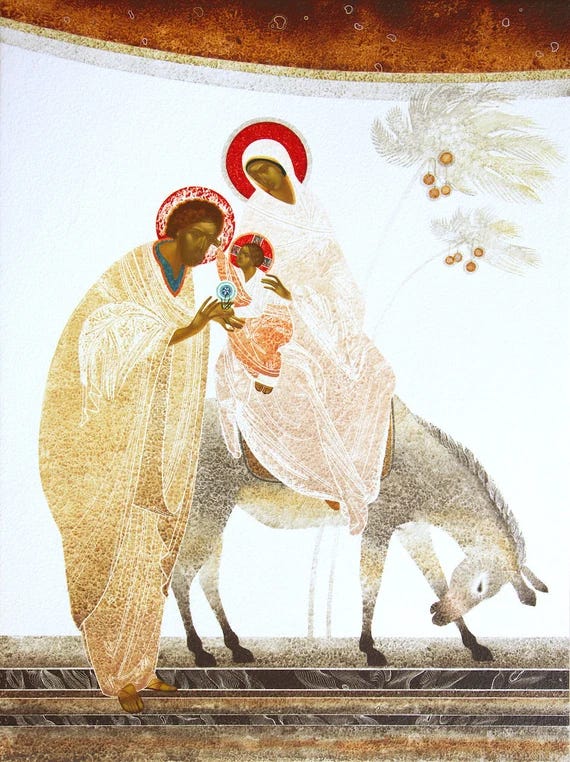
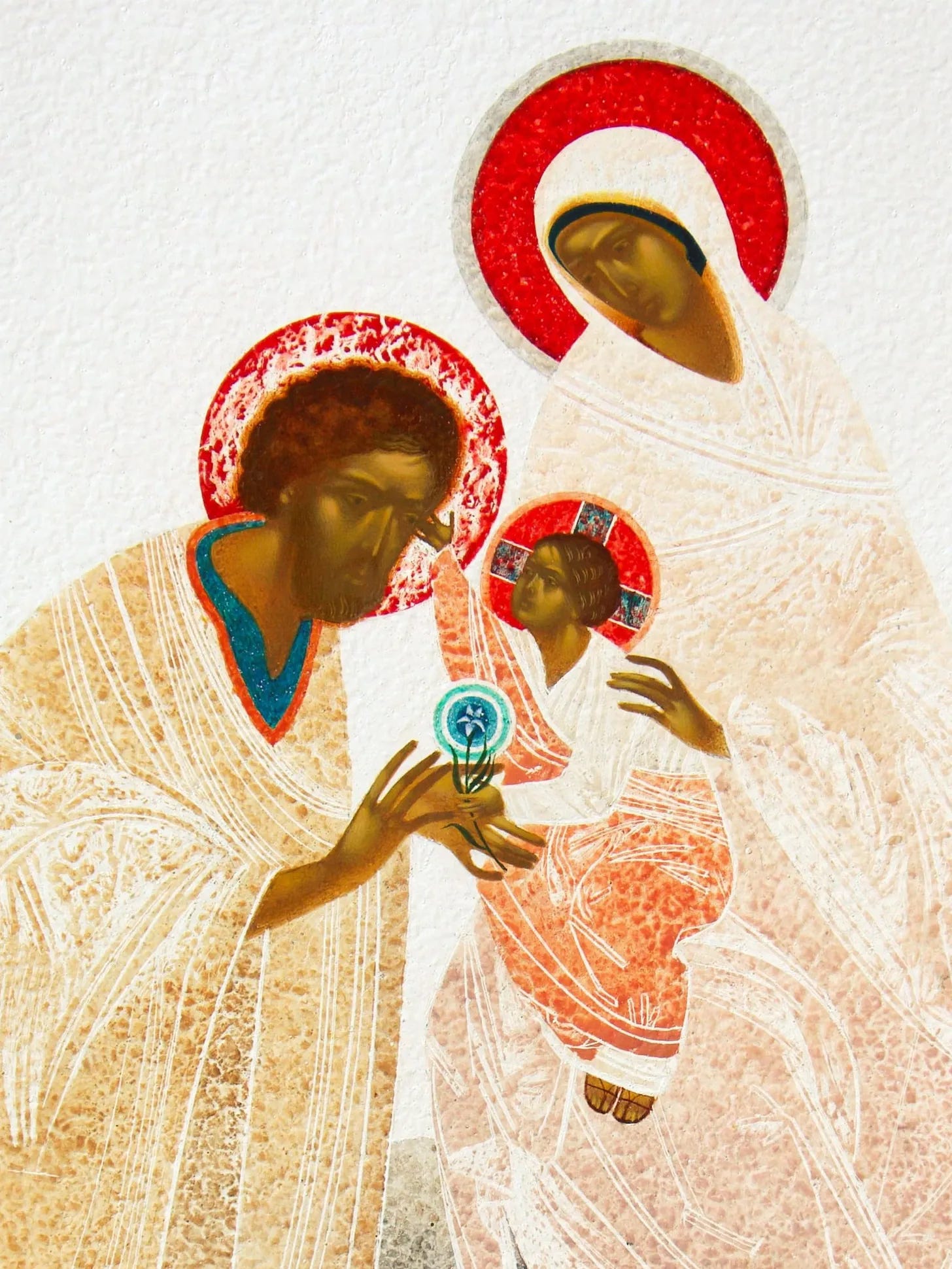
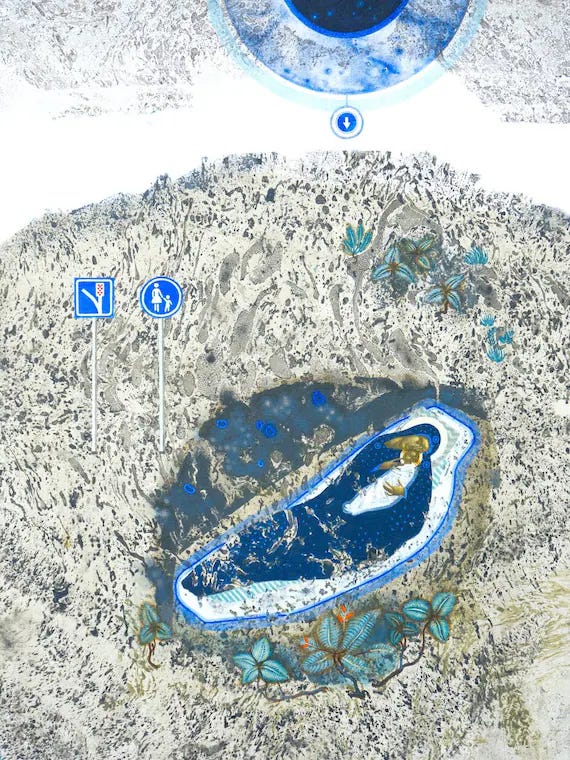
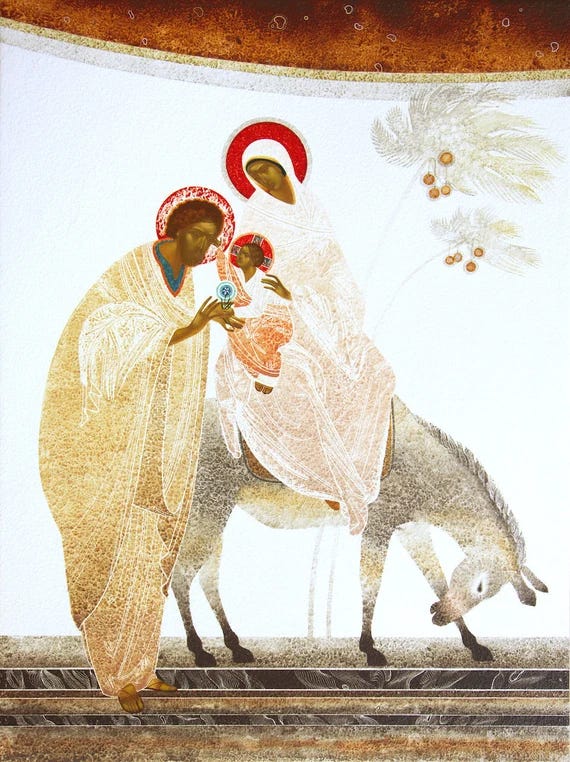
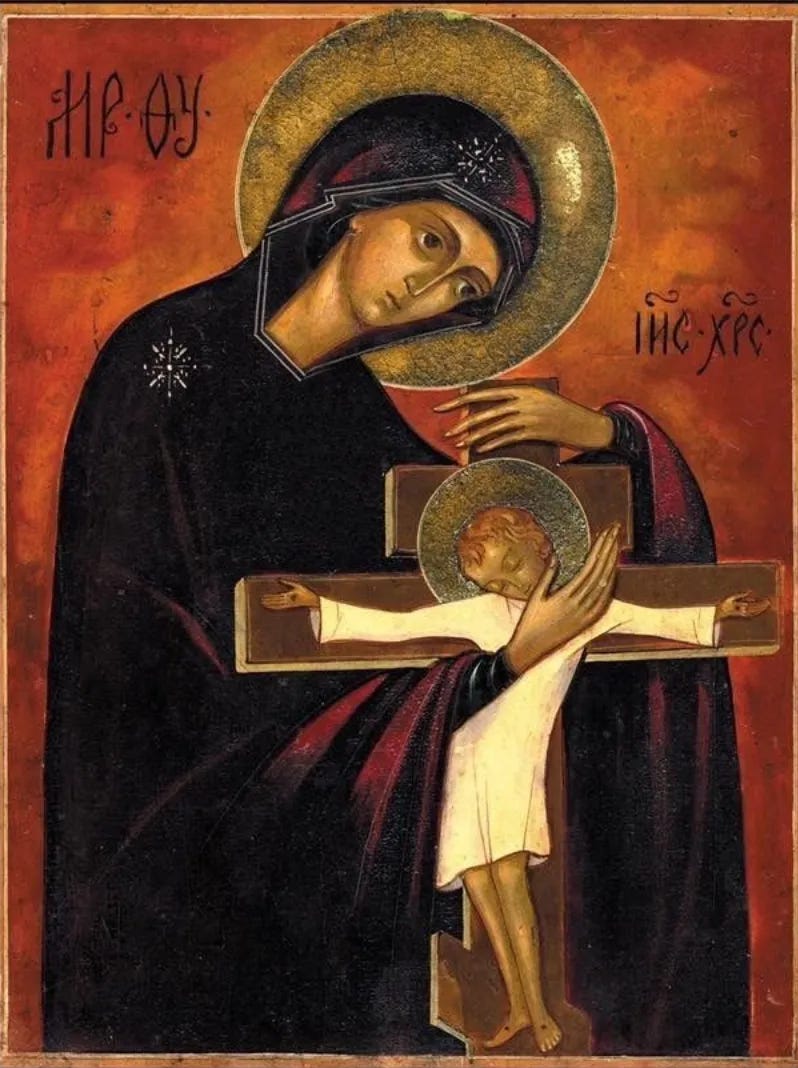
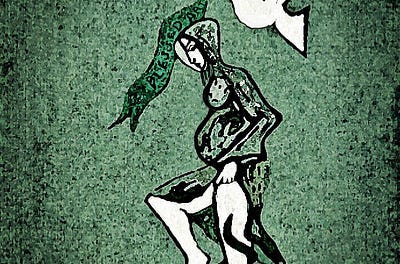
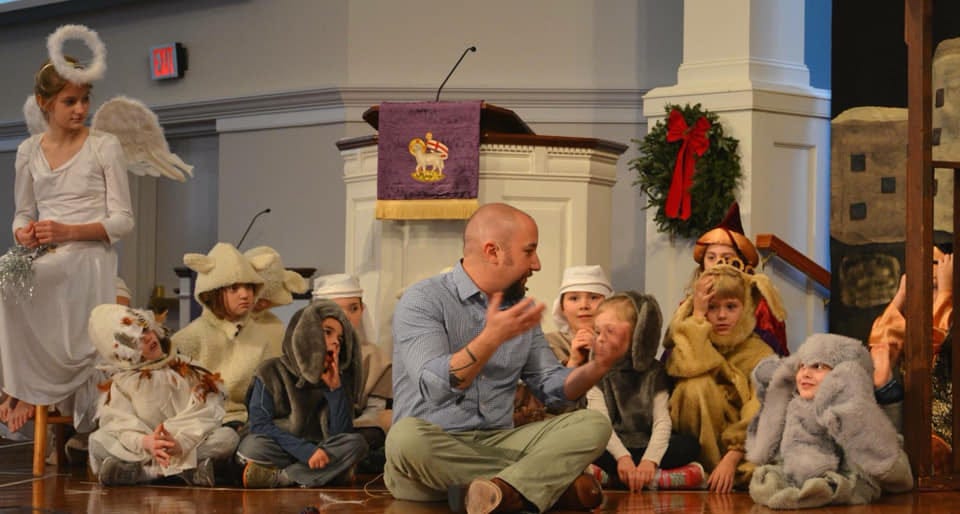
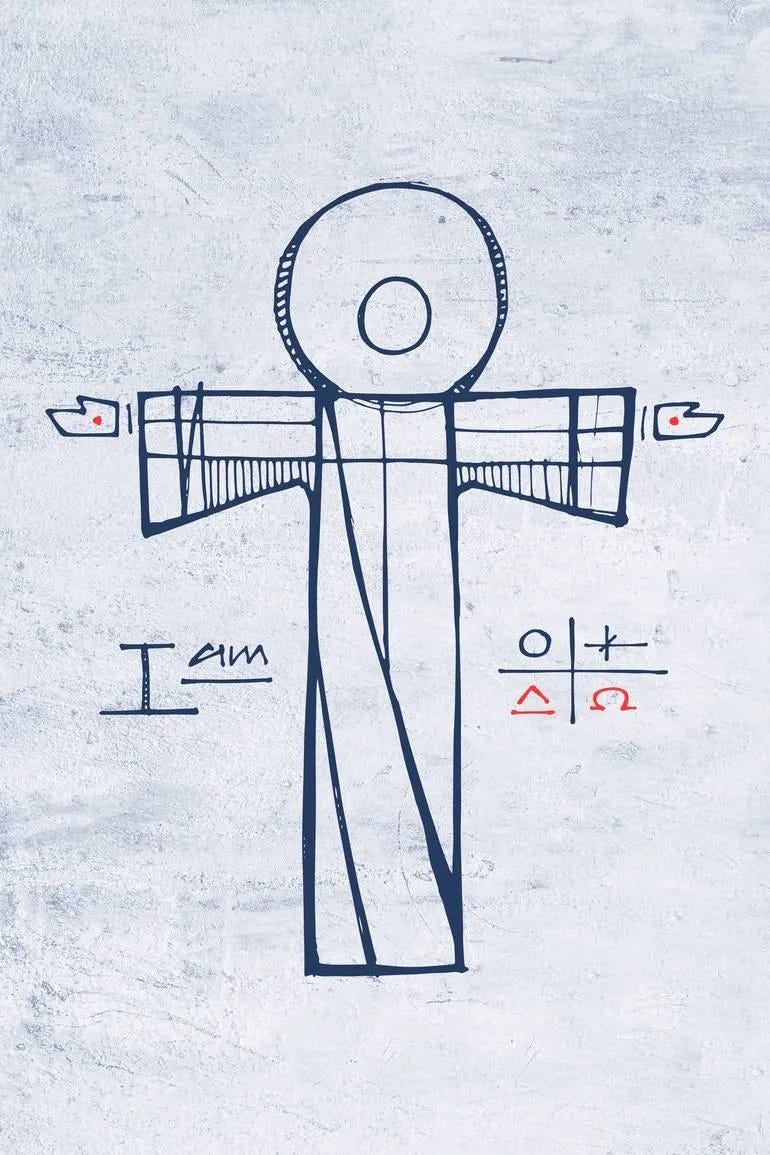










Share this post